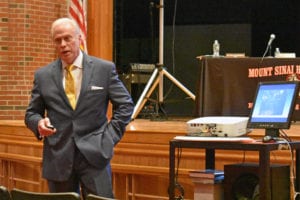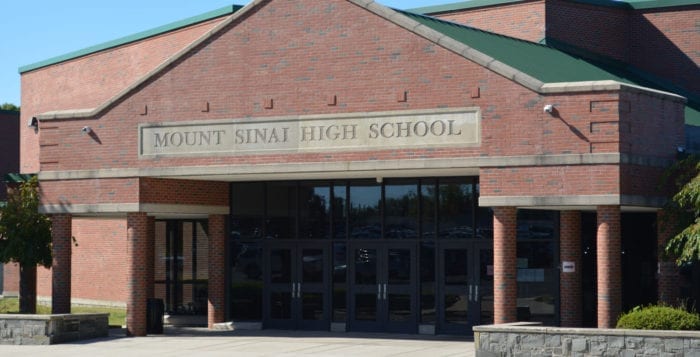Audit of Mount Sinai shows surplus fund balance
Most people would be ecstatic to have millions of dollars put aside for a rainy day, but for school districts it’s not such a benefit, at least according to state law.
The New York State comptroller, who serves as a financial watchdog on public institutions, issued a report June 1 that said the Mount Sinai School District had amassed millions of dollars in its fund budget higher
than the legal max of 4 percent of the districts overall budget. Mount Sinai has said it intends to comply with the suggestions of the report, but some trustees said the restrictions on rainy-day funds only hamper the
district’s ability to handle its finances.
“We knew we couldn’t wait — those projects needed to be done now. I think that according to the [budget] vote the residents agreed with us.”
— Gordon Brosdal
“If you spent all the money you got every year, and then had nothing left, how fiscally responsible is that?” incoming board trustee Steve Koepper said.
The report said officials overestimated expenditures by more than $7.5 million and had underestimated revenues by $1.7 million from the 2014-15 through the 2016-17 school years. In the three years examined in the report, the district operated at a surplus and did not use any of its appropriated fund balance. This led to Mount Sinai’s unrestricted fund balance to be equal to 19.8 percent of the overall 2016-17 budget, way above the 4 percent limit.
The unassigned fund balance is developed from a school district having leftover, unspent funds by the end of each school year, and these funds accumulate. There are three levels to a districts total fund balance, including the restricted fund balance, which can only be spent for specific purposes like retirements; the appropriated balance, which is what the district sets up every year that can be spent from the overall funds; and the unassigned fund balance, or the unused portion. As of the 2016-17 school year, the district had $1.61 million appropriated and $9.9 million unassigned, according to the report.
Superintendent Gordon Brosdal said at the June 12 board of education meeting that talks with auditors have been congenial, and that they already have plans in motion to resolve the issue by using the funds in the already established capital project.
In the district’s 2018-19 adopted budget Mount Sinai residents voted 787-176 in favor of using $5 million of the unassigned fund balance to make repairs to the high school roof, upgrade the turf field and replace the campus’ perimeter fences, as well as other school security improvements.

“We hope that they will listen to our plan to spend down the fund balance, rather than just say, ‘No, your fund balance is too high,’” Brosdal said.
Brian Butry, a spokesperson for the comptroller’s office, said Mount Sinai is not the only district in the state that has been caught with a surplus of unassigned fund balance.
“We have districts in the state showing that they are using fund balance, but that money is not being spent,” Butry said. “You have districts planning for one thing that doesn’t materialize, or you have districts overestimating their expenditures and then just continually have this surplus that rolls over into the next year.”
According to Butry, the penalty for not complying with the comptroller’s report could be a withholding of state funds up to the amount that district’s fund balance is over the 4 percent limit.
Koepper works as the superintendent of buildings and grounds at Sayville school district, and he said that so many districts do not operate within the limit because it does not make financial sense to do so.
“To be imposed upon by the state ties our hands, because if emergencies occur what do you do?” Koepper said. “Especially because you’re not allowed to overspend your budget.”
“To be imposed upon by the state ties our hands, because if emergencies occur what do you do? Especially because you’re not allowed to overspend your budget.”
— Steve Koepper
Butry said the law is in place to keep school districts from having too much money on hand that’s not being put toward productive use. He added the comptroller’s office often recommends putting the surplus into a one-time expenditure or to use it in subsequent school years for reducing the tax levy.
Brosdal said the district had already planned to use the unrestricted fund balance for the capital projects months before the district received any news on the comptroller’s findings.
“We knew we couldn’t wait — those projects needed to be done now,” Brosdal said. “I think that according to the [budget] vote the residents agreed with us.”
In the letter to the state comptroller the district also said it would be establishing a capital reserve of $750,000 in an effort to reduce the unassigned fund balance. The district letter said there’s five-year-plan
effects that should reduce the overage by more than half, below the 4 percent limit, within two years. This will include tightening the amounts the district uses in fund balance appropriations for future school years.
Butry said that the comptroller’s office was largely satisfied with the district’s response so far.
“To their credit,” he said, “they did say they were putting this money to use.”







